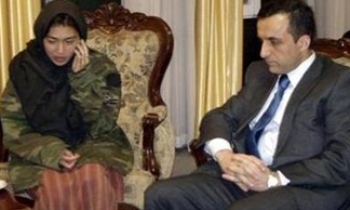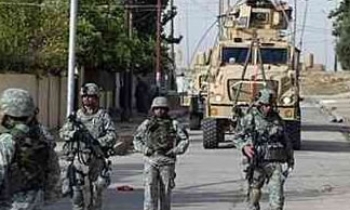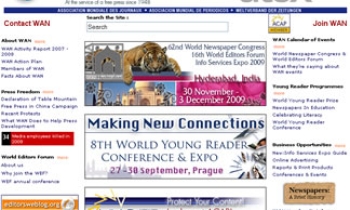The Moroccan government has blocked access to websites dealing with the Polisario Front's struggle for Sahrawi independence. Western Sahara websites like arso.org, cahiersdusahara.com, cahiersdusahara.com, wsahara.net and spsrasd.info have all been rendered inaccessible in Morocco since November 21, according to Paris-based press freedom group Reporters sans Frontières (RSF).

These sites all criticise Morocco's control of Western Sahara and encourage protests, but they do not call for violence. RSF said in a statement, "It should not be possible to take a decision to filter a website without a fair trial taking place first. Banning an online publication simply on the basis of an administrative decision is a serious violation of free expression."
A "connection failure" type of error message is displayed when someone tries to access one of these sites. The decision to block may have been taken by the communication ministry, which is responsible for censorship, or the interior ministry, while monitors the Sahrawi problem. Local sources said the filtering can nonetheless be easily sidestepped by using an online proxy such as www.anonymizer.com.
ARSO – the Free and Legitimate Referendum in Western Sahara Support Association – carried photos on its website in September that showed Sahrawi prisoners being held in extremely harsh condition in the prison in El Ayoum, the territory's main city. The local state prosecutor reacted by ordering an investigation with the aim of "exposing all those implicated in this vile act that jeopardises the reputation of the prison where the inmates are held."
Morocco seized most of Western Sahara after Spain withdrew from the territory in 1975. Western Sahara is rich in phosphates, fish and oil, and has been at the centre of UN-brokered peace talks between Moroccan authorities and the independence-seeking Polisario Front for the past seven years.

The Western Sahara conflict is little known outside of Morocco, says a report on the website of the International Freedom of Expression Exchange (IFEX). A vast desert territory that has been occupied by Moroccan troops since 1975, it is home to indigenous Sahrawis who continue to resist occupation and demand political independence. Not surprisingly, the Moroccan government is not keen to have the world scrutinising its operations.
The Sahrawi are the Arab nomads of Western Sahara, bound together by their Yemeni ancestry and their dialect, Hassaniya, which remains close to classical Arabic. For centuries, they roamed the territory with their camels and goats, sometimes trading with Spanish colonisers, and became known as "blue men" for the indigo robes they wear.
When Spain abandoned Western Sahara in 1975, Morocco invaded and drove the Sahrawi into neighbouring Algeria. Trading their camels for Land Rovers, they fought a guerrilla war under the leadership of the Polisario Front, an independence movement, until the UN brokered a ceasefire in 1991. Since then, the promised vote on independence has been stalled by disagreement over who should be allowed to participate.

RSF says journalists who report on the conflict are routinely harassed. Between April and June itself, at least 10 journalists were attacked, arrested or expelled from the Western Sahara capital of Laayoune, where Sahrawis have been holding demonstrations against the Moroccan occupation.
Moroccan authorities have used various methods to control information about the demonstrations, first barring reporters from entering Western Sahara, then organising strictly controlled guided tours of the territory.
The police have also used violence to intimidate the press. Salama Zoukani, a technician with a local television station, was brutally beaten by security forces on May 25 this year. Another journalist, Maria Cristina Berasain of Spain's Basque-language daily "Berria", was expelled from Western Sahara on June 2.
On April 12, a Moroccan court banned independent journalist and former newspaper owner Ali Lmrabet from practicing journalism for 10 years. The Court of First Instance in Rabat found him guilty of defaming a pro-government group known as the Association of Relatives of Saharawi Victims of Repression and ordered him to pay 50,000 dirhams (US $5,825) in damages.

The charges against him stem from a lawsuit filed by the association in response to an article that Lmrabet published in the Spanish daily El Mundo November 2004. Lmrabet had referred to the Saharawi people in the Algerian city of Tindouf as refugees, contradicting the Moroccan government's position that they are prisoners of the Polisario Front. Neither the association nor its spokesman Ahmed Khier were mentioned in Lmbaret's article. No local journalist that the Committee to Protect Journaliss (CPJ) spoke with had ever heard of the association or Khier prior to January 2005, when Lmrabet first attempted to get a license to launch his successor weekly, Demain Libere.









